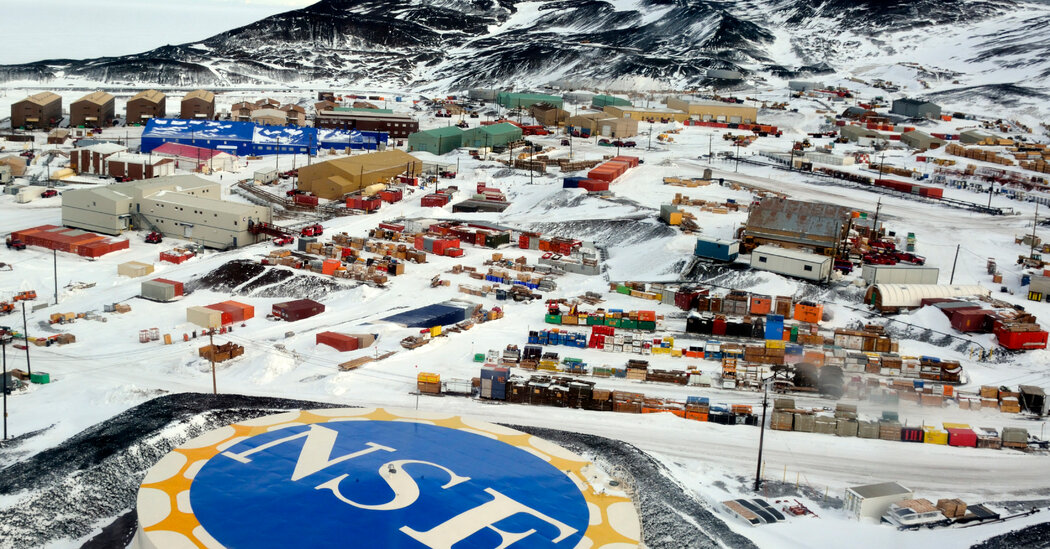

The independent monitor for the National Science Foundation is sending investigators to McMurdo Station in Antarctica who should arrive on Monday after a report last year raised concerns about sexual assault and harassment at a U.S. research base.
The foundation’s Office of Inspector General is sending two people to the remote station for roughly two weeks to prepare “for a future on-site presence in Antarctica and meet with staff to explain our role,” Lisa Vonder Haar, the office’s chief of staff, said in an email.
McMurdo Station, the main U.S. station in Antarctica, can host more than 1,000 workers during the summer season, according to the National Science Foundation, a federal agency that supports research and education in science. In the winter, the population reaches a peak of about 220 people.
The station has a citylike infrastructure that includes dormitories, a firehouse, utility plants and stores. Scientists there research glaciers, wildlife, climate change and other topics.
Last year, a National Science Foundation report found that many members of the Antarctic program said that sexual assault, sexual harassment and stalking were problems in the program.
The June 2022 report was based on interviews, online surveys and focus groups with people at McMurdo Station and other research sites and field work locations in Antarctica.
These research sites are isolated and co-workers live in close quarters, which the report said “creates a complicated dynamic that blurs the boundaries between personal and professional life.”
In October 2022, the foundation’s Office of Inspector General began an independent inspection of the U.S. Antarctic Program’s prevention of, and response to, sexual harassment and assault.
The office has had special agents respond remotely to complaints from workers at Antarctic research stations since July and it is “working toward having an on-site presence during future austral summer seasons,” Ms. Vonder Haar said.
She said the Office of Inspector General has also been building its ability to investigate sexual assaults, including by deploying trained special agents to Antarctica after a sexual assault.
Ms. Vonder Haar said that the assistant inspector general for investigations and a special agent who has investigated sexual assaults in remote environments would be at the research station from Monday to Nov. 17, barring weather delays.
About a year after the foundation released its internal report, The Associated Press published an investigation that said the “isolated environment and macho culture” at McMurdo Station had allowed sexual assault and harassment to flourish. The investigation was based on court records, internal communications and interviews with more than a dozen current and former employees at the research base.
The 2022 report said that in focus groups, 59 percent of women said that they had a negative experience with sexual assault or sexual harassment. Of these women, 95 percent knew of someone who had experienced sexual assault or sexual harassment in the program, the report said.
The report included excerpts from interviews with workers, who were not named, including a woman who said that on her first day at McMurdo Station, she was told “to stay clear of Building [X] unless I wanted to be raped.”
Another interviewee said that women at McMurdo sometimes carry tools, such as a hammer, or other items to use as weapons, because they didn’t think anyone was looking out for their safety.
The report said there was a “widely shared perception” among those interviewed that victims would be punished for reporting sexual misconduct and that the perpetrators would be allowed to keep their jobs, or even receive promotions.
The report also found that a system for prevention was “almost absent,” and resources were focused on response instead.
In addition to the investigators’ trip to Antarctica, the foundation announced on Thursday that it had appointed Renée Ferranti as a special assistant to the foundation’s director for sexual assault and harassment prevention and response implementation.
She will assess existing policies, advise on resource allocation and recommend organizational improvements, the agency said.
The foundation’s director, Sethuraman Panchanathan, said in a statement that the job was a “critical role, as NSF continues to strengthen our efforts to promote safe research environments for all.”
“Addressing this pervasive problem remains a top priority for me and the agency, and with Renée’s expertise we will continue to adapt and further accelerate our efforts to address the evolving landscape of sexual assault prevention and response,” he said.
24World Media does not take any responsibility of the information you see on this page. The content this page contains is from independent third-party content provider. If you have any concerns regarding the content, please free to write us here: contact@24worldmedia.com

Common Mistakes When Using Athletic Field Tarps

High-Performance Diesel Truck Upgrades You Should Consider

Warehouse Optimization Tips To Improve Performance

Fire Hazards in Daily Life: The Most Common Ignition Sources

Yellowstone’s Wolves: A Debate Over Their Role in the Park’s Ecosystem

Earth Day 2024: A Look at 3 Places Adapting Quickly to Fight Climate Change

Millions of Girls in Africa Will Miss HPV Shots After Merck Production Problem

This Lava Tube in Saudi Arabia Has Been a Human Refuge for 7,000 Years

Four Wild Ways to Save the Koala (That Just Might Work)

National Academy Asks Court to Strip Sackler Name From Endowment

Ways Industrial Copper Helps Energy Production

The Ins and Out of Industrial Conveyor Belts